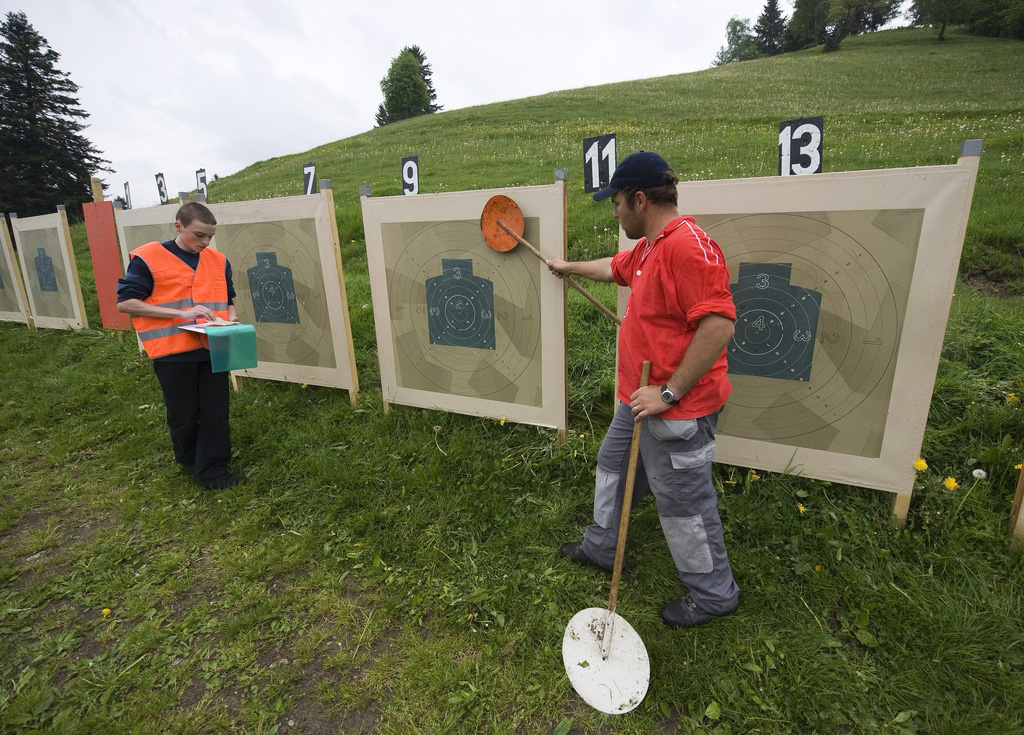
Swiss voters stick to their gun tradition

Justice Minister Simonetta Sommaruga says Switzerland remains a safe country despite the rejection of a proposal to restrict access to firearms.
Just over 56 per cent of voters on Sunday threw out a proposal by an alliance of non-governmental groups and centre-left parties to ban army-issue firearms from the home and set up a central arms register in a bid to curb gun violence.
Admitting defeat the supporters of the anti-gun initiative looked on the bright side.
“We achieved a great deal by launching the initiative and without winning the initiative. Army guns can be stored in arsenals and there is a growing awareness of the risks of firearms,” said Alliance F, a leading women’s organisation.
The president of the Swiss Medical Association, which backed the initiative, said the issue of security would not go away, but a change in mentality would take a long time.
Security issue
Evi Allemann of the initiative committee and a parliamentarian for the centre-left Social Democratic Party, said the campaigners would continue to press for more comprehensive statistics on gun violence and a programme for suicide prevention.
She acknowledged that opponents had run a successful publicity campaign.
“We failed to show that the protection of lives is also a Swiss value,” she told public radio.
The winners of the day, including most centre-right and rightwing parties, said the voice of reason had prevailed.
“It is a vote of confidence in the militia army, in typical Swiss values such as freedom, trust, self-responsibility and security,” the committee against the anti-gun initiative said.
Dora Andres of the shooters association added that the existing gun law, amended in 2008, was sufficient and had to be applied properly.
Tighten gun law
Justice Minister Sommaruga told a news conference that the option for militia solders to store their guns at arsenals and a ban on keeping ammunition at home were important steps taken to reduce the misuse of guns.
“The government and parliament have gradually restricted access to weapons and improved controls over the past years,” she said on behalf of the cabinet.
Sommaruga, who personally supported the initiative, pledged to seek additional measures against gun violence. She plans to boost the exchange of information on gun use with countries outside the European single-border area and to improve the gun tracing system.
She called for increased cooperation between Switzerland’s 26 cantons by granting mutual access to online gun registers.
Divide
The outcome of Sunday’s nationwide ballot showed considerable differences between the different language regions and between urban and rural regions.
“Conservative and rural regions in German-speaking Switzerland together with Italian-speaking Ticino outvoted French-speaking western Switzerland,” said political scientist Claude Longchamp on public television.
Only six out of 26 cantons, notably in the west of the country and in urban regions including Geneva, Zurich and Basel approved the anti-gun initiative.
Geneva recorded a yes majority of about 61 per cent. However, rural cantons, particularly in central and eastern Switzerland, voted up to 72 per cent against.
Turnout was comparatively high with 49 per cent.
The initiative was aimed at introducing a strict licensing system for the use of firearms and sought a ban on the purchase of automatic weapons and pump action shotguns.
It also called for the creation of a central register for firearms, instead of a cantonal system and a ban on storing army-issue guns at home.
The proposal was launched in 2007 by a broad alliance of NGOs and had the backing of centre-left political parties.
Stop gun violence initiative
Final results:
Yes: 43.7%
No: 56.3%
Turnout: 48.8%
Around 177,500 citizens, including 55,000 Swiss expatriates, were eligible to cast their vote over the internet.
Only 14.4% took part in the e-vote which is part of ongoing tests in 12 cantons, according to the Federal Chancellery.

In compliance with the JTI standards
More: SWI swissinfo.ch certified by the Journalism Trust Initiative































You can find an overview of ongoing debates with our journalists here . Please join us!
If you want to start a conversation about a topic raised in this article or want to report factual errors, email us at english@swissinfo.ch.